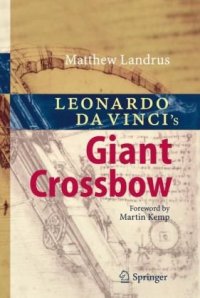
Ebook: Leonardo da Vinci’s Giant Crossbow
Author: Matthew Landrus (auth.)
- Tags: Engineering Design, History of Science, Appl.Mathematics/Computational Methods of Engineering, Popular Science in Mathematics/Computer Science/Natural Science/Technology, Arts, Geometry
- Year: 2010
- Publisher: Springer-Verlag Berlin Heidelberg
- City: Berlin
- Edition: 1
- Language: English
- pdf
Although Leonardo’s Giant Crossbow is one of his most popular drawings, it has been one of the least understood. "Leonardo’s Giant Crossbow" offers the first in-depth account of this drawing’s likely purpose and its highly resolved design. This fascinating book has a wealth of technical information about the Giant Crossbow drawing, as it’s a complete study of this project, though this is as accessible to the general audience as much as it is also informative with new discoveries for the professors of engineering, technology and art. The book explores the context of Leonardo’s invention with an examination of the extensive documentary evidence, a short history of the great crossbow and ballista, the first accurate translation of the text and the technical specifications, and a detailed analysis of Leonardo’s design process for the crossbow, from start to finish. Dozens of preparatory drawings, along with the recent discovery of nearly invisible metal stylus preparatory incisions under the ink of the Giant Crossbow drawing, are evidence of Leonardo’s intent to offer engineers and other viewers a thorough design of the massive machine. The book proposes these new discoveries with the help of a strategy that had been at the core of Leonardo’s working philosophy: the proportional method. As proven with an analysis of the Giant Crossbow project, he used a consistent approach to 1/3rd proportions throughout the design and drawing process and employed this kind of proportional strategy at the start of almost every important project. Thanks to this proof of his knowledge of geometry, evidence of his studies of impetus and force, and thanks to the highly polished and complex nature of the Giant Crossbow design, a later date for the drawing is proposed in the present book, associating the drawing with his drafting capabilities around 1490-93.
Although Leonardo’s Giant Crossbow is one of his most popular drawings, it has been one of the least understood. "Leonardo’s Giant Crossbow" offers the first in-depth account of this drawing’s likely purpose and its highly resolved design. This fascinating book has a wealth of technical information about the Giant Crossbow drawing, as it’s a complete study of this project, though this is as accessible to the general audience as much as it is also informative with new discoveries for the professors of engineering, technology and art. The book explores the context of Leonardo’s invention with an examination of the extensive documentary evidence, a short history of the great crossbow and ballista, the first accurate translation of the text and the technical specifications, and a detailed analysis of Leonardo’s design process for the crossbow, from start to finish. Dozens of preparatory drawings, along with the recent discovery of nearly invisible metal stylus preparatory incisions under the ink of the Giant Crossbow drawing, are evidence of Leonardo’s intent to offer engineers and other viewers a thorough design of the massive machine. The book proposes these new discoveries with the help of a strategy that had been at the core of Leonardo’s working philosophy: the proportional method. As proven with an analysis of the Giant Crossbow project, he used a consistent approach to 1/3rd proportions throughout the design and drawing process and employed this kind of proportional strategy at the start of almost every important project. Thanks to this proof of his knowledge of geometry, evidence of his studies of impetus and force, and thanks to the highly polished and complex nature of the Giant Crossbow design, a later date for the drawing is proposed in the present book, associating the drawing with his drafting capabilities around 1490-93.